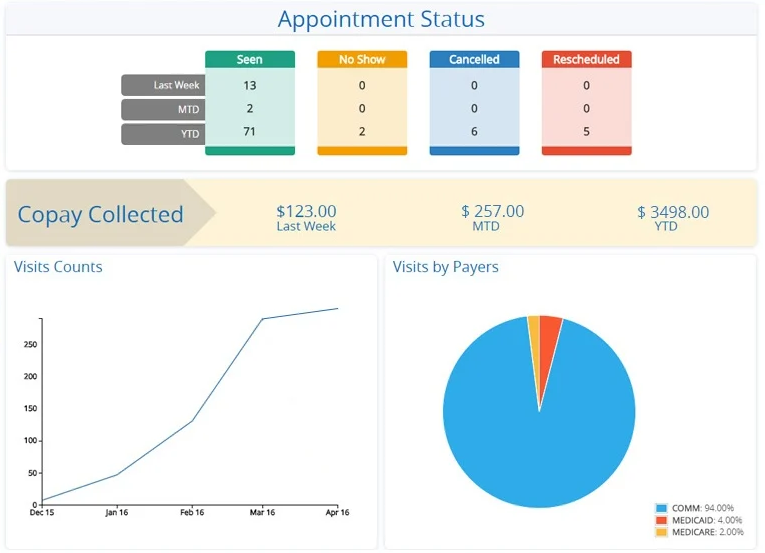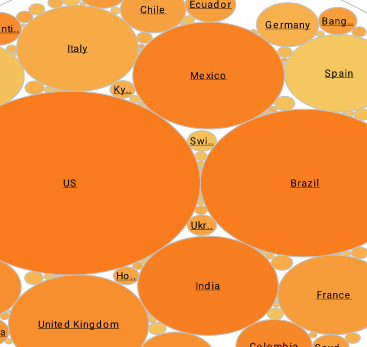What KPIs and Analytics Does an EHR Analyst Use?
EHR (Electronic Health Record) technologies have revolutionized how patient data is maintained, saved, and analyzed in contemporary healthcare. The need for an EHR analyst is growing as the healthcare sector continues to depend extensively on technology.
EHR analysts are in charge of maintaining and improving electronic health record systems to make sure they satisfy the requirements of both patients and healthcare providers.
We are going to look at the key performance indicators (KPIs) and analytics used by EHR analysts to assure the effective operation of EHR systems in this article.
| #1 Ranking: Read how InetSoft was rated #1 for user adoption in G2's user survey-based index | Read More |
The Role of an EHR Analyst
Understanding the function of EHR analysts within the healthcare ecosystem is essential before diving into the particular KPIs and analytics they use. EHR analysts are highly qualified individuals who straddle the line between technology and operational healthcare. In order to manage, enhance, and optimize EHR systems, they collaborate closely with IT teams, healthcare providers, and other stakeholders.
KPIs for EHR Analysts
System Uptime and Downtime
System uptime, which calculates the proportion of time the EHR system is completely functional, is one of the most important KPIs for EHR analysts. Downtime may cause patient care to be disrupted, which can have serious repercussions. To guarantee constant access to patient information, EHR analysts keep an eye on uptime and work to enhance it.
System Response Time
Another critical KPI is how quickly the EHR system reacts to user inputs. Inefficient response times might make healthcare professionals impatient and reduce their productivity. To provide a smooth user experience, EHR experts examine response times and try to enhance system performance.
User Adoption Rates
EHR systems only have value when they are properly embraced and utilized by healthcare practitioners. EHR analysts monitor user adoption rates to spot any areas that can benefit from further guidance or assistance in order to promote greater acceptability and use.
Data Accuracy and Completeness
In order to provide patients with safe and effective treatment, the EHR system's patient data must be accurate and comprehensive. EHR analysts carry out data validation checks and routinely audit the data to find and fix any errors or omissions.
Analytics Used by EHR Analysts
Data Usage Patterns
Knowing which EHR system features healthcare practitioners use the most often may be learned via analyzing data consumption trends. This knowledge may direct system modifications and customization to better suit user requirements.
Workflow Analysis
Workflow analysis is done by EHR analysts to learn how healthcare practitioners use the system on a daily basis. They may advise workflow modifications to optimize procedures and boost productivity by detecting bottlenecks and inefficiencies.
Security and Privacy Audits
In the healthcare industry, it is crucial to maintain patient data's confidentiality and privacy. EHR analysts carry out regular audits to make sure that access to sensitive data is adequately controlled and that the system complies with applicable laws like HIPAA.
Performance and Scalability Testing
The demands placed on healthcare companies' EHR systems rise as they expand. EHR analysts use performance and scalability tests to evaluate the system's ability to manage increased data volumes and user loads while still being responsive and reliable.
 |
Learn about the top 10 features of embedded business intelligence. |
Improving EHR Systems Through KPIs and Analytics
Identifying User Training Needs
Analysts of electronic health records (EHR) may identify areas where healthcare practitioners can benefit from further training by looking at user acceptance rates and system use trends. By doing so, user competence and overall system usage are improved.
Enhancing System Customization
Understanding data consumption patterns and process analysis helps to pinpoint areas where system customization might enhance efficiency and user experience. Customized EHR systems more closely match the unique requirements of healthcare institutions and providers.
Predictive Maintenance
EHR analysts may use analytics to predict possible system problems and proactively fix them before they cause downtime. Predictive maintenance guarantees smooth system performance and reduces interruptions to patient care.
 |
Learn the advantages of InetSoft's small footprint BI platform. |
Additional KPIs for EHR Analysts
Meaningful Use Compliance
The Centers for Medicare & Medicaid Services (CMS) established a set of standards called "meaningful use" to promote the adoption and "meaningful use" of EHR technology. EHR analysts monitor the organization's adherence to these standards to make sure they are eligible for government incentives and are not subject to sanctions.
Interoperability Metrics
The capacity of various EHR systems and healthcare apps to smoothly exchange and utilize data is known as interoperability. To improve care coordination and patient data sharing, EHR analysts evaluate the system's interoperability measures, such as the effective exchange of health information with external systems.
Data Backup and Recovery Performance
To make sure that patient data is safeguarded against data loss and system failures, EHR analysts routinely assess data backup and recovery performance. To protect data integrity and reduce interruptions in the event of unanticipated events, adequate backup mechanisms are crucial.
Patient Engagement Metrics
Patient involvement in their medical treatment may result in better results. To evaluate the success of patient engagement programs, EHR analysts monitor patient engagement data including patient portal use, appointment reminders, and patient-provider dialogue.
Read what InetSoft customers and partners have said about their selection of Style Report as their production reporting tool. |
Advanced Analytics for EHR Analysts
Predictive Analytics for Patient Outcomes
EHR analysts may use predictive analytics to find patterns and trends that can point to the likelihood of certain medical diseases by using past patient data. This may allow medical professionals to take preemptive action and avert negative results.
Natural Language Processing (NLP) for Clinical Notes
EHR analysts may evaluate unstructured clinical notes using NLP technology to extract important data about illness patterns, treatment efficacy, and adverse occurrences. These studies may support programs for quality improvement and evidence-based decision-making.
Clinical Decision Support System (CDSS) Performance
EHRs often include CDSS, which offers healthcare professionals evidence-based suggestions and guidelines while treating patients. EHR analysts evaluate the CDSS's effectiveness to make sure it provides precise and relevant information to support clinical choices.
Population Health Analytics
To evaluate population health trends and identify patient groups at high risk, EHR analysts examine aggregated patient data. Designing specialized treatments and preventative care plans is made easier with the use of population health analytics.
 |
View live interactive examples in InetSoft's dashboard and visualization gallery. |
Quality and Regulatory Metrics
Quality Reporting Metrics
The Merit-based Incentive Payment System (MIPS) and the Quality Payment Program (QPP) are two regulatory systems that require EHR analysts to monitor quality reporting indicators. These measures assess the level of care delivered and have an effect on how much healthcare practitioners are paid.
Compliance with EHR Certification Standards
The Office of the National Coordinator for Health Information Technology (ONC) and other organizations have set particular certification requirements that EHR systems must achieve in order to be certified. For data security and interoperability, EHR analysts make sure the system conforms with these requirements.
User Satisfaction Surveys
EHR analysts should conduct user satisfaction surveys to get direct input from end users and healthcare providers. These polls aid in pinpointing the EHR system's pain spots, usability problems, and prospective development areas.


